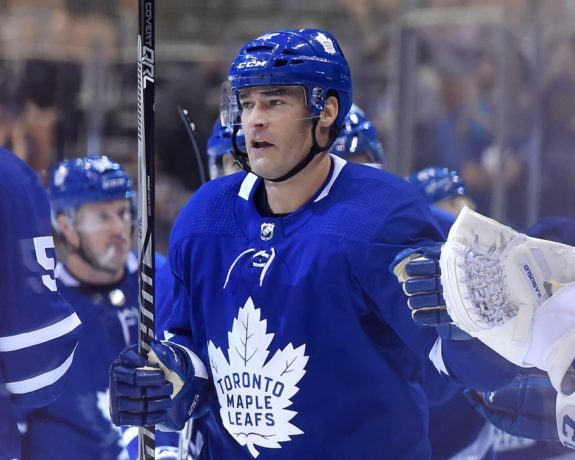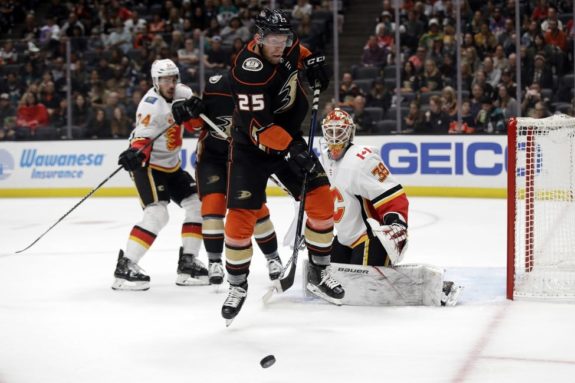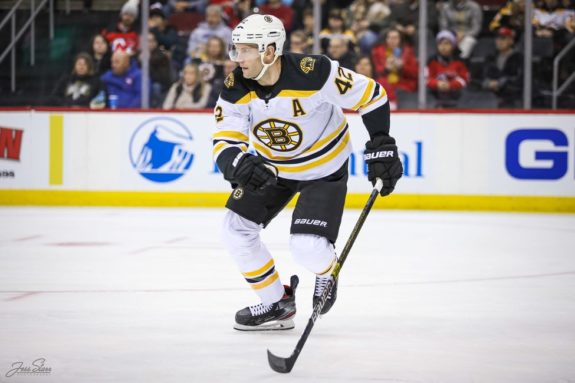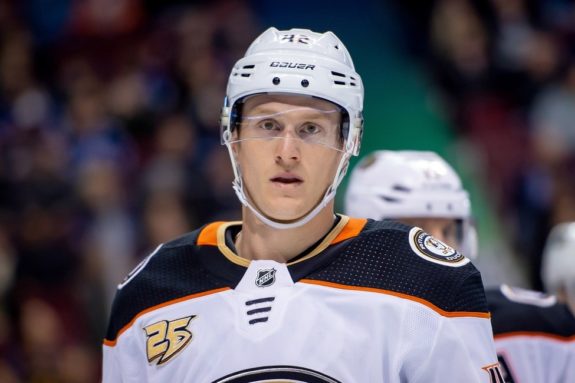
 Anthony Ciardelli
The Hockey Writers
Anthony Ciardelli
The Hockey Writers
39
Reads
0
Comments
Ducks Didn’t Lose the Kase Trade
Friday morning, the Anaheim Ducks announced that they had traded Ondrej Kase to the Boston Bruins in return for David Backes, defensive prospect Axel Andersson and a first-round pick. Some Ducks fans and media reacted negatively to the news, while the Bruins contingent were mostly happy.
This trade isn’t as cut and dry as some think it is for both teams. Those who are ready to declare the deal a victory for Boston cite the Bruins ridding themselves of 75% of Backes’ cap hit and acquiring a player like Kase. Meanwhile, those who frowned on the Ducks trade disapproved of the prospect they received in Andersson and trading a player who still showed flashes of high-end ability. But, this trade isn’t one-sided at all and might turn out better for the Ducks than it will for the Bruins.
A Maple Leaf in the Wind
A major complaint of the trade revolves around Anaheim having to give up Kase and take on Backes and 75% of his salary to receive a first-round pick. Some have referenced the trade that occurred this past summer that saw the Toronto Maple Leafs send 40-year-old Patrick Marleau and his $6,250,000 contract to the Carolina Hurricanes (who bought him out shortly after that.)
The Hurricanes also received a conditional first-round pick and a seventh-round pick while the Maple Leafs got the Hurricanes’ sixth-round pick. People compared this trade and the Ducks trade and wondered why Carolina gave up only draft capital in return to the Maple Leafs when the Ducks had to give up an NHL player — and a decent one at that.
Specifically, if the motivation for both trades was to eliminate burdensome contracts, why did Bob Murray give up a player? The answer is that the Bruins trade wasn’t strictly a salary cap dump, and the Maple Leafs and Bruins were in two different positions when it came to how the salary cap would affect signing their own players.
Related: Anaheim Ducks’ 5 Worst Trades in Franchise History
The Hurricanes were and are a playoff team; they were unlikely to give up a roster player in an attempt to increase their return.

The Ducks are not a playoff team, and as promising as Kase’s analytics are, they mean nothing if he can’t stay on the ice, especially with a history of head injuries. He could very well end up on the shelf again for the Bruins, in which case this trade looks a lot worse for Boston.
Maple Leafs Were in Cap Hell
More importantly, the Maple Leafs were in an extreme cap situation and could not afford to take back a player making an NHL salary.
Related: 20 Biggest NHL Trades in the Past Year
It was an ice cream headache and still is, but this article describes it well. At the time Toronto traded Marleau, they still had Mitch Marner, Kasperi Kapanen and Andreas Johnsson left to sign, with just over $7 million in cap space to do it. The Marleau trade opened things up a little, but they are also relying on six players and over $24 million worth of cap relief via long-term injured reserve to keep those players.
Ducks and Bruins Were Perfect Partners
The Bruins were actively looking for a skilled second-line winger and were rumored to be pursuing Chris Kreider, Tyler Toffoli and Kase. They also will have restricted free agents Jake DeBrusk, Matt Grzelcyk, Karson Kuhlman and Anders Bjork and free agent Torey Krug to re-sign. Zdeno Chara might also need a contract if he doesn’t retire.
Related: Bruins Trade Heinen to Ducks for Ritchie
Still, the Bruins’ salary cap situation wasn’t quite as dire as the Maple Leafs’. They won’t have to dole out nearly $11 million per season for just one of those players. As a result, the Bruins could afford to add Kase in return for a first-round pick.
According to Pierre LeBrun of The Athletic, the Bruins offered the best package for Kase. The Hurricanes and Calgary Flames both also tried to acquire him, but the Bruins were the only team to offer a first-round pick.

Although Carolina and Calgary didn’t require the Ducks to take on part of a burdensome contract, the Ducks valued that first-rounder and calculated that taking on most of Backes’ contract and giving up Kase was worth it (from “LeBrun: The Kase price, Ottawa’s Pageau options and the Jets’ underrated moves “The Athletic, 2/21/2020)
The Ducks drafted Kase in the seventh round in 2014 and basically turned him into a first-round pick. If you went back and re-drafted the 2014 Draft, he would probably go late in the first round anyway, which is probably where the pick the Bruins traded to the Ducks will end up.
David Backes Lands in Anaheim
The Bruins have been trying to offload Backes and at least part of his contract. It became clear recently that the Ducks were willing to take on a player with a burdensome contract like Backes’ to add draft capital.
The Ducks more or less traded Kase and better salary cap flexibility to Boston in exchange for the pick and Andersson.
Related: Bruins Waiving Backes Was Tough, But Correct Decision
The Ducks wouldn’t have made the trade if they thought Backes would have put them in salary cap jail and having Ryan Kesler and his $6,875 million contract eligible to be placed on long-term injured reserve adds extra insurance.

Backes has struggled with the increase in speed and skill in the NHL in his last two seasons in Boston. The Bruins waived him, but he refused to report to the AHL, further motivating Boston to try and trade him. Now that he’s in Anaheim, he may have an opportunity to revive his career. Will he? It’s unlikely, but he’s not going to stop the Ducks from achieving anything this season or next in all likelihood.
Ducks Secure Two First-Round Picks for Second Consecutive Year
The most important aspect of this trade for the Ducks was the first-round draft pick. Yes, it will be late in the first round considering that the Bruins are a Stanley Cup contending team and leading the President’s Trophy race, but the Ducks have a history of drafting well late in the first round.
Though it’s too early to tell, 2019 29th-overall pick Brayden Tracey looks promising. Say what you want about their current core of developing young players, but Sam Steel (No. 30 overall) and Max Jones (No. 24 overall) were late first rounders and are still very early in their careers. Shea Theodore went No. 26 in 2013, and Rickard Rakell went No. 30 in 2011. A late first rounder can yield productive players and is just icing on the cake when you will, more than likely, have a top-10 pick before that.
Don’t count out Andersson either. The Bruins might not have valued him that highly, but he’s a right-shot, something the Ducks still lack. He has been described as a future “bubble” NHL player or maybe a bottom-pair defender, but don’t forget who else experts described that way before he cracked the NHL. That would be current top-pairing defender Josh Manson, a seventh-round pick.

The Ducks’ trade of Kase to the Bruins in exchange for Backes, Andersson, and a first-round pick isn’t a loss. They need to accumulate draft capital, and the higher in the draft the better. Murray wouldn’t have taken on 75% of Backes’ contract without doing the math for the Ducks’ future, and it’s too early to count out Andersson. Don’t use the Maple Leafs and Hurricanes trade as a comparison because Toronto and Boston were in very different situations. This trade is good for the Ducks.
All contract information from capfriendly.com
The post Ducks Didn’t Lose the Kase Trade appeared first on The Hockey Writers.
Popular Articles

















































 Canucks Vancouver
Canucks Vancouver Sharks San Jose
Sharks San Jose Flames Calgary
Flames Calgary Avalanche Colorado
Avalanche Colorado Coyotes Arizona
Coyotes Arizona Golden Knights Vegas
Golden Knights Vegas Wild Minnesota
Wild Minnesota Red Wings Detroit
Red Wings Detroit Blues St. Louis
Blues St. Louis Blackhawks Chicago
Blackhawks Chicago Blue Jackets Columbus
Blue Jackets Columbus Hurricanes Carolina
Hurricanes Carolina Jets Winnipeg
Jets Winnipeg Predators Nashville
Predators Nashville Ducks Anaheim
Ducks Anaheim Oilers Edmonton
Oilers Edmonton Sabres Buffalo
Sabres Buffalo Rangers New York
Rangers New York Bruins Boston
Bruins Boston Panthers Florida
Panthers Florida Senators Ottawa
Senators Ottawa Lightning Tampa Bay
Lightning Tampa Bay Capitals Washington
Capitals Washington Islanders New York
Islanders New York Devils New Jersey
Devils New Jersey Maple Leafs Toronto
Maple Leafs Toronto Flyers Philadelphia
Flyers Philadelphia Penguins Pittsburgh
Penguins Pittsburgh Stars Dallas
Stars Dallas Kraken Seattle
Kraken Seattle Kings Los Angeles
Kings Los Angeles






